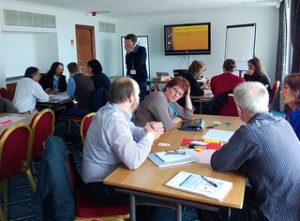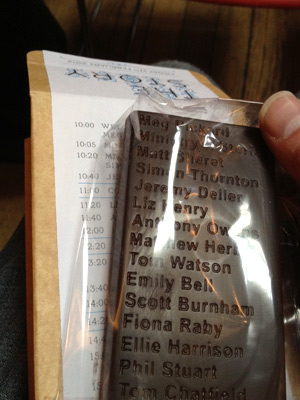I’d been looking forward to Storyville 2013, the Higher Education Academy’s 2013 Arts and Humanities conference, for two reasons: firstly, the excellent title/theme of narratives and storytelling; secondly, the fact that the first combined HEA Arts & Humanities conference in 2012 had been one of the most rewarding I’d attended.
The theme ensured that many of the presenters had thought much harder about what they were proposing – and the range of flexible session types with an emphasis on interaction (short and long workshops, ‘wildcard’ sessions, panels) meant that the usual sit-and-listen stance of an academic conference was very definitely not in evidence. This, combined with a very convivial setting in the large open plan ground floor of the Thistle Hotel in Brighton, ensured that there were always interesting stories, thoughts and chatter to be found.
I’d been invited to begin the conference by attending one of the HEA’s policy breakfasts – this particular one on the multitude of pertinent issues changing the face of Higher Education currently. From a range of discipline bases we discussed the effect of fees, shifting socioeconomic student makeup, and the role of academic and transferrable skills. I was impressed by the level of discussion and range of responses offered, and it is pleasing to see the HEA taking a proactive yet communal role in considering such key issues.
The opening keynote, from Vicky Gunn (Director of the Learning and Teaching Centre, University of Glasgow), drew on her own subject base of early medieval philosophy, to question the “tall tales we tell about teaching”: which stories we inherit from our own experience as students or apprentices, and which ones we choose to pervade or reject when faced with new and changing narratives as lecturers. There was to be no soft anodyne start to this remarkable conference: Vicky both commanded and rewarded thoughtful attention, as she introduced her ideas through some engaging personal stories.
 It was straight into my own session then, taking a room of participants through an energetic, mildly competitive game design workshop (using the model I developed with Nic Whitton, but this time ably delivered with Katie Piatt, who popped in from her local University of Brighton and also captured the session beautifully in photographs). A number of compelling stories, and very workable games, emerged 90 minutes later.
It was straight into my own session then, taking a room of participants through an energetic, mildly competitive game design workshop (using the model I developed with Nic Whitton, but this time ably delivered with Katie Piatt, who popped in from her local University of Brighton and also captured the session beautifully in photographs). A number of compelling stories, and very workable games, emerged 90 minutes later.
Sadly, I was only able to stay for the first of the two days, due to a conflicting invitation to another excellent event (report to follow); but even the one day was full to the brim of interesting and challenging sessions. Before a good lunch, short papers covered the use of the Hunger Games as a metaphor for teacher training (in particular, equipping oneself effectively and creatively for particular challenges); and the use of abstracts as a peer discussion/reflection tool for students submitting essays – this latter paper gave rise to a really interesting discussion of the use of shorter summaries (abstracts, précis, even one line and 140 character forms) to encourage reflection on the main structure and arguments in an essay; and to provide peers with an easy way to compare approaches in a tutorial or seminar setting.
In the afternoon, I chose two longer workshops for their challenging natures. The first presented Keith Turvey’s narrative ecology heuristic as a way to make sense of professional (and personal) identities. Working with a colleague who runs the HE programmes at Circus Space (in itself an interesting challenge in mapping contexts) we struggled at first with the approach, thinking it to be over-dependent on technical determinism; but working with Keith we found it quite rewarding to use his ‘arch’ structure as a way to think about dependencies: aspects of persona which need other aspects to cement or grow them. By the end of the session we could see some use in using this with students to reflect on their own academic and professional development. The second workshop was way out of my comfort zone – the use of dance to investigate the state of ‘flow’ (Csikszentmihalyi) as a measure of connectedness/engagement with a learning activity. Although my own attempts stopped fairly early and I retired to the sides to watch (and no, there is no video evidence), our observation/participation was used to great effect in the prolonged discussion afterwards (a good half an hour after the workshop was due to finish), covering a range of methods one might use to observe/measure flow in more traditional learning sessions – and why one might want to.
The day finished with the conference dinner, where more stories were shared over an excellent meal. By the end of a long day (8am to midnight), my head was spinning with the range of different tales I’d been part of. Although my own narrative shifted to Belfast the next day, I kept a close eye on the busy Twitter stream (collected here) which gave glimpses of further fascinating narratives.
As we discussed over dinner, it is hard to see how the Arts & Humanities team can top this next year: but with two excellent, thoroughly interesting/stimulating events to their belt, I’m sure they’ll have a good go.





